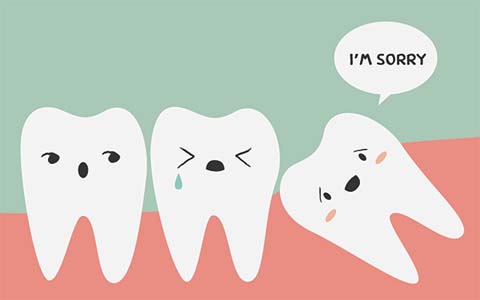
The future looks slightly different. Some scientists believe that in the future, no one will be born with wisdom teeth. Using the principles of evolution, our bodies will no longer create them because we will not have a need for a third set of molars.
Where does that leave us today?
If wisdom teeth were completely necessary for the past, they may be entirely unnecessary in our future. Having wisdom teeth is something that can make no impact on your health or something that can cause significant challenges. The scenario and individual faces will depend on various factors. However, there are some clear risks involved with keeping your wisdom teeth if they grow in impacted or sideways.
Many people deal with impacted wisdom teeth that do not grow in at a healthy position. As a result, this creates spaces between wisdom teeth and the adjacent molar that become ground zero for trapped food, plaque, and subsequent decay. The resulting cavities and infections can be incredibly uncomfortable, to say the least. If you are constantly getting food stuck in the areas near your third molars, this is a sign that you should visit our Cleburne office to discuss extracting them.
Another reason to have these teeth removed is if you have had braces or will be getting them. When your wisdom teeth do grow in, they can cause your other teeth to be pushed forward. After wearing braces for a couple of years and working hard to improve your smile, something as simple as an extra set of molars can reduce some of that work.
How are they removed?
If we need to extract your wisdom teeth, there are two main ways of doing so. If the teeth grow in fairly straight but need to be removed for orthodontic purposes, we can numb the area and pull them out just like with any other tooth. If, however, they are impacted or still below the gums, we will need to surgically extract them. This is done by creating a flap within the gum tissue, pulling it back, and cutting away any tissue or bone holding the tooth in place. Next, we will begin to wiggle the tooth to see if we can extract it. If not, we will need to break it up into smaller pieces in order to do so. After, our Cleburne dental office will clean the area and secure the flap. All this will be done under anesthesia to help you remain comfortable.
Related Posts
What Are Impacted Wisdom Teeth?
Concerned about impacted wisdom teeth? Read on to learn more about this condition and how it is addressed. The third pair of molars at the rear of the mouth is known …
Healing From Wisdom Tooth Extraction
The patient does not feel any discomfort during wisdom teeth extraction, but there is a recovery period after treatment. It is important to follow proper aftercare instructions to reduce the risk …
Wisdom Tooth Extraction: Is it Painful?
Wisdom tooth extraction is common as a lot of individuals experience eruption. The procedure is known to induce anxiety because it does require pulling teeth. However, modern technology has allowed for better techniques, which reduce …
The 48 Hours After Your Wisdom Teeth Have Been Removed
If you need your wisdom teeth removed, you are in good company. The majority of people do not have room in their mouth for this third set of molars and must have them either pulled …


